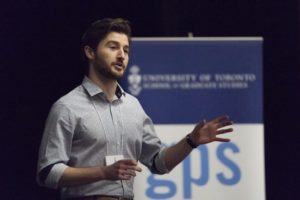
Peter Serles (MIE MASc 1T9, MIE PhD candidate) has been named a 2024 Schmidt Science Fellow in recognition of his efforts to wield interdisciplinary research to drive sector-wide change.
At the University of Toronto, Serles explored various applications of nanomechanics and nanomaterials. With support from the Schmidt Science Fellowship, he will begin his postdoctoral research at the California Institute of Technology (Caltech) this summer, using nano-3D printing to develop high-quality clusters of brain tissue. Serles plans to develop a supporting micro-environment that mimics the human brain to help neural tissue mature and grow into a complex structure, to enable better modeling of diseases and test treatments.
The Schmidt Science Fellows is an initiative of Schmidt Sciences, a philanthropic organization founded by Eric and Wendy Schmidt to advance scientific exploration and discovery and develop solutions to global issues.
Serles joins a cohort of 32 fellows who will undertake a year-long science leadership program to prepare them to join the next generation of interdisciplinary science leaders, alongside a one- to two-year research placement at a new institution.
“Being given the freedom and support to work on high-risk, high-reward research will allow me to ask the biggest questions I can and develop entirely new areas of expertise that I can eventually bring back to Canada,” says Serles.
“Nano-3D-printed scaffolds for neural organoids combine cutting edge-technologies in mechanical engineering and neuroscience to, hopefully, solve some of our most pressing issues.”
The Schmidt Science Fellows is delivered in partnership with the Rhodes Trust.
“It’s at the edges of things — ecosystems, borders, disciplines — where the most interesting ideas are developed, solutions that don’t arise from any single approach,” says Wendy Schmidt in a press release.
“We’re excited to welcome the 2024 cohort of Schmidt Science Fellows to approach these edges, look at problems anew, share insights with each other and the world and, we hope, go on to develop solutions to some of humanity’s most pressing challenges.”
– This story was originally published on the University of Toronto’s Faculty of Applied Science and Engineering News Site on April 25, 2024, by Rahul Kalvapalle with files from Safa Jinje.